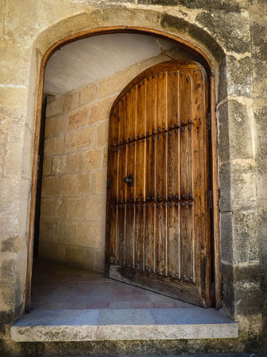 As many of you know, after 3 years of pandemic living without a positive COVID-19 test, the coronavirus officially hit our house 2 weeks ago. Since the day my spouse and I got our positive test results we have been quarantined, rarely leaving the house except to go outside with our dogs or to get groceries via contactless pickup. We worked from home, (what a privilege, I know!) and we cooked at home. We read books that we had at home, and even watched ridiculous television on streaming services–all at home. And then, just like that, the symptoms decreased and we tested negative. As quickly as we had been thrust into quarantine life, we were thrust back out. We had crossed a threshold into illness and all that it required of us, and now, we have crossed a threshold again. All without the heavens ever stopping to ask us if we were actually ready to cross that threshold. All without our permission or consent for the universe to change our lives. Thresholds are like this though. John O’Donohue says that “To acknowledge and cross a new threshold is always a challenge. It demands courage and also a sense of trust in whatever is emerging. This becomes essential when a threshold opens in front of you, one for which you had no preparation.” In other words, thresholds will take us from here to there, whether we are ready for the change or not, but such changes are not a cause to panic. Which, I know, is a thing that is easier to talk about than it is to live out. Because change isn’t always about emerging from an illness or a quarantine or a separation. Sometimes the thresholds we cross take us to a place of uncertainty, of loss, of loneliness, of dis-ease. John O’Donohue puts it this way, “Think for a moment how, across the world, someone’s life has just changed–irrevocably, permanently, and not necessarily for the better–and everything that was once so steady, so reliable, must now find a new way of unfolding.” One of the great unknowns of our very human existence is when and how change will come. The only thing we know for sure is that it will. And when it does–no matter how earth-shattering, or life-altering or mundane it is–as we step across the threshold from what was to what will be, we have at our fingertips both an opportunity and a promise. The opportunity to trust–even if our hearts are breaking or our will is tattered and our spirits shake. And the promise, as John O’Donohue says, “That whatever comes, the great sacrament of life will remain faithful to us, blessing us always with visible signs of invisible grace.” So maybe that is our task, dear friends: To look for those visible signs of invisible grace that are holding us as we cross life’s thresholds. Perhaps our work is not to fight the winds of change or to try with everything we’ve got to side-step the throughways of our lives, but instead to open our eyes, our hearts, and our minds as we step into them and see how and where and in whom grace is present. I don’t know, but I think it’s worth a shot. Looking for visible signs of invisible grace with you, Pr. Melissa Comments are closed.
|
Rev. Melissa Sternhagen
Rev. Melissa Sternhagen was called as the pastor of St. Paul Congregational UCC in June of 2020. Prior to her call to St. Paul, Pr. Melissa worked as a hospice chaplain in the Ames, IA area, following pastorates at rural churches in Central Iowa and Southern Illinois. Pr. Melissa is a second-career pastor with a background in agribusiness and production & supply operations. She received her M.Div. from Eden Theological Seminary in St. Louis, MO, and holds a MA Ed. in Adult Education and Training, and a BA in Organizational Communications. Archives
July 2024
Categories |

 RSS Feed
RSS Feed
